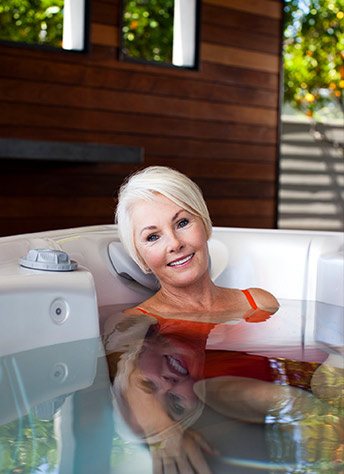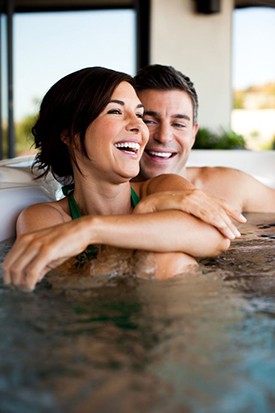How to Keep Your Hot Tub Water Clean
A Comprehensive Guide to Quality Hot Tub Maintenance
Splash! Spray! Spritz! Ah, water. Humans are composed of approximately 60% water and we need it to stay alive. The average hot tub is filled with 200 – 700 gallons of water and it needs to be clean, clear and sparkling to provide life-giving benefits. Creating and maintaining healthy water balance and chemistry is attainable once you know the essentials.
It is vital to know the best water care options for your hot tub. Educating yourself is the key to develop a cache of tools that alleviate any water related challenges. You will build confidence in your routine as you achieve and maintain proper water chemistry. Keeping your hot tub ready to serve you and your family is the goal. Sparkling, clean, clear water will propel you past the goal line. Let’s plunge into the knowledge.
4 Best Tools & Resources to Test your Hot Tub Water
-
Hot Tub Water Test Kit
Do-it-yourself water testing kits are simple to use and provide an on-the-spot evaluation. Water chemistry kits are available online or from spa and pool supply retailers. They include a plastic device used to gather a water sample, and small bottles of chemicals designed to test your water. Most kits provide the ability to test your water’s chlorine levels and the pH (alkalinity / acidity) of your water. There are easy to follow directions. Start by filling one or two plastic tubes with spa water. A few drops of chemical added to the water activate a response that changes the color of the water. For example, chlorine may be shown in shades of yellow, and acidity / alkalinity in varied shades of red or green. The plastic tubes have a range of numbers and colors on them to match the color of the water sample. Use this information and refer to the directions to determine a course of action. You may need to add a treatment chemical or you may not. Remember, it is important to replace your chemicals if they reach an expiration date.
-
Hot Tub Water Quality Test Strips
This is an option that is quick, easy to use and understand. The strips are designed to activate once you dip them in your hot tub water. Most will give you an indication of chlorine, water harness, alkalinity, and even calcium. Directions are easy to follow. Use the results to determine a course of action to achieve optimal water quality.
-
Local Hot Tub Retailer
Your local Caldera® Spas retailer can help you with any issue related to your hot tub or pool. They can provide you with a bottle to bring in a sample for spa water testing. Do this as often as needed. They are happy to serve. Their equipment is sensitive and provides a thorough evaluation of the water. A written form of test results will usually be provided. They can direct you to the water care items you need to correct any water imbalances you may have. Be mindful that all recommendations may not be required. The more educated you are about your water chemistry the more likely you are to purchase only the essential items you need.
-
Hot Tub Service Professional
Whether it comes down to know how or simply time availability, you always have the option to hire a professional to manage your hot tub water chemistry. Sometimes it is just the most practical option. Your service provider should be reliable, fair about their fees, and arrive for their visits on a consistent basis. The last thing you want to do is spend more time managing a service provider than you would managing your own hot tub water chemistry. A great service provider can be a welcome member of the team that takes care of your home. Do your research and you’ll be happy with your decision.
Find a hot tub water care
routine that works for you
It is easy to be drawn into the idea that your hot tub water needs to be perfect. Well, there’s a reason why all the measuring devices include a range of acceptability. There are many things that affect the quality of your hot tub water including but not limited to heat, sun, chemicals and how many people use the hot tub (aka bather load). Rest assured variations are guaranteed and adjustments are always within reach. Use your favorite method to determine the healthy ranges for your water, and then relax. Your confidence will build as you develop a routine that works for you.
Best Caldera® Spas Hot Tub
Water Treatment Options
It is important to learn about products that help you create the optimal hot tub water treatment experience for you, your family and friends. The following are a few essential items that will make your life easier and your hot tub water clean, clear and sparkling;

Clean, clear, sparkling water provides the optimal hot tub experience
FROG® @easeTM In-Line System with SmartChlor® Technology
- Pre-filled mineral and chlorine cartridges eliminate the guesswork and provide carefree sanitation.
- In-line cartridges are smart and convenient. They fit inside your filtration system and automatically maintain consistent levels of sanitization.
Monarch® CD Ozone System
- Concentrated ozone bubbles neutralize contaminants in your hot tub water.
- The most effective hot tub water care system can be yours by using the ozone system with the @ease SmartChlor cartridge.
- If an almost chlorine-free experience is what you want combine the ozone system with Monarch Silver Cartridges, which uses silver ions to inhibit bacteria growth.
Clean Screen® Pre-Filter
- Fill your hot tub with the cleanest, most balanced water possible; attach Clean Screen to your garden hose as a pre-filter to remove organic contaminants, tannins, copper, iron and other metals as you fill your spa.
Common Hot Tub Sanitizers Chart
|
|
|
|
Essential Hot Tub Water Care Products
pH Up and pH Down. The pH balance of a liquid refers to the acid / alkaline balance. The pH scale runs from 1 to 14, with 7.0 being neutral. Any measure below 7.0 is considered acidic, which can cause deterioration of the fittings and surfaces of your hot tub. Any measure above 7.0 is considered alkaline. The optimal pH for hot tub water is 7.4, which happens to be the same pH level as the human eye.
Defoamer. A defoamer eliminates foaming caused by soap, shampoo, cleaners and other residues. While it is recommended that you shower before going in a hot tub, it isn’t always practiced. It can also be used to manage foam caused by soft water.
Conditioners and stabilizers. Water harshness can be lessened by using water conditioners. For example, use Vanishing Act which removes calcium buildup for softer-feeling water that is silkier on your skin. It helps protect your spa from the damaging effects of hard water. Stabilizers help keep water chemicals balanced.
Chlorine-free alternatives. An option for virtually chlorine-free water care combines the CD Ozone System and Monarch Silver Cartridges. Enzyme based sanitizers are also a chlorine-free option.
Stain and Scale Defense. You want crystal clear water and you want your hot tub’s surface to look its best too. Stain and Scale Defense prevents calcium build up on spa surfaces and controls stain and scale formation.
Calcium Hardness Increaser. Extremely soft water can corrode the shiny and soft surfaces of your hot tub. Calcium Hardness Increaser raises calcium levels in spa water to protect against this type of soft water related damage.
Maintaining a water care routine with effective treatment options is essential
Quick Troubleshooting for Common Hot Tub Water Problems
|
|
|
|
|
|
|
|
How to Maintain Your Hot Tub Filter System
Check the filter regularly for debris, dirt, oils and sludge. Think of the grates in your filter as the gills on a fish. They need to be clean to keep the fish alive. Remove and rinse the filter using a hose with a nozzle to get it clean. Soak the filter in a bucket with an appropriate filter cleaning solution prior to rinsing it if there are excessive impurities. Any rips or tears in the filter fibers is an indication that replacement is required. Replacing your filter is an easy fix that will bring back your hot tub’s ability to play its part in creating sparkling, clean, clear water.
Know When to Drain and Refill Your Hot Tub Water
Depending on usage and conditions you will likely be draining and refilling your hot tub every 3 to 4 months or longer. Use the measures of water quality to determine when and if your hot tub needs to be drained. If you experience extreme difficulty in maintaining proper ranges it may be time to drain, refill and reset. Other circumstances like the drought conditions in your state or community may limit your ability to drain and refill. But with today’s advanced hot tub technologies, excellent water treatment options, and a bit of dedicated attention your water will stay in optimal condition. Any time you drain your hot tub use this time to clean and protect the surface of your hot tub’s interior and exterior surfaces according to manufacturer’s recommendations. Your hot tub lid deserves some care and attention too.
This helpful hot tub maintenance guide will help ensure your hot tub is your sanctuary for improved health and wellbeing. The more you love your hot tub, the more you’ll use it!

Don't let sensitive skin issues hold you back from spending time in a hot tub.

